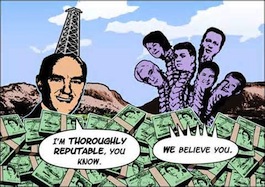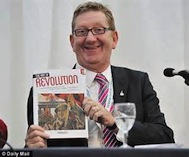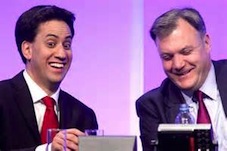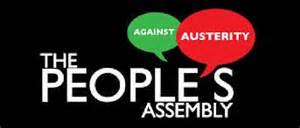Allan Armstrong (RCN) analyses two recent developments in the Scottish referendum campaign.

The SNP government’s referendum on the future constitutional status of Scotland – ‘Yes’ for ‘Independence-Lite’ (or as Michael Russell terms it ‘Independence within the Union’), or ‘No’ for acceptance of the UK status quo – is still over a year away.
However, two events have occurred recently, which have considerable bearing on the conduct of the referendum campaign. It has been revealed that behind the scenes, some organisers of the mainstream unionist Labour/Conservative/Lib-Dem ‘Better Together’ alliance have dubbed their campaign ‘Project Fear’. Furthermore, the Guardian has reported that the UK Ministry of Defence (MoD) has been looking to ways of designating the Faslane Trident base sovereign UK territory, in the event of a ‘Yes’ vote. Faslane would become, in effect, Scotland’s own Guantamamo Bay.
This article examines the significance of these two events for socialists. Right from the start, ‘Yes’ campaigners have, with much justification, styled ‘Better Together’ the ‘No’ campaign, because of its overwhelming negative approach. Hardly a day passes without us being told about some new disaster that will occur, if people in Scotland dare to vote ‘Yes’. Therefore, the revelation that the main drive behind the ‘No’ campaign is ‘Project Fear’ is not that surprising, although somewhat embarrassing for its organisers.
Many ‘Yes’ supporters claim that the ‘No’ campaign’s negativity can be overcome by offering an alternative positive campaign. It worked for Barack Obama in 2008, and for the SNP in the 2011 Holyrood campaign, so surely it will work for the official ‘Yes’ campaign in the lead up to the 2014 referendum. Indeed, the most politically naïve wing of the ‘Yes’ campaign seem intent on repeating Ally Macleod’s Scotland’s 1978 World Cup tactics – just cheer on your own side loudly and long enough and victory is in the bag!
However, the failure of Labour’s Holyrood campaign in 2011 alerted the British ruling class to the problems represented by the SNP’s electoral victory. Labour had made the mistake of thinking it was refighting the 2010 Westminster General Election. Then, by conducting an anti-Tory campaign, Labour had been able to claw back some electoral support from the SNP, and restore its number of Scottish MPs to the same level as 2005, when it was last elected the UK government.
One year later, though, with the Tories representing no real threat in the Holyrood elections, Labour’s profoundly negative campaign backfired spectacularly. After the unexpectedly large SNP victory, the British ruling class soon appreciated that its campaign of opposition to the SNP’s ‘Independence-Lite’ would need to be conducted in greater depth, and not just rely on the Labour Party.
This is because the overwhelming majority of the British ruling class support the existing UK constitutional set-up. They see no benefit in the SNP’s ‘Independence-Lite’ proposals, although these only amount to a further reform of the UK, not to its abolition in Scotland. They remain opposed, despite all the reassurances about the continued role of the monarchy (and hence the Crown Powers), the Bank of England, the British High Command and NATO, given by the SNP government. The British ruling class is currently digging in, closing down any alternative political options, the better to help them weather the storms ahead. Therefore, they are preparing their anti-independence counter-offensive on several levels. ‘Project Fear’ is only the most publicly visible component.
The mainstream unionists’ first political aim, now secured, has been to ensure that the SNP conducts its referendum campaign under Westminster rules. This means the SNP and the official ‘Yes’ campaign are restricted to the use of those permitted constitutional mechanisms and campaigning methods devolved from or sanctioned by Westminster. The SNP, as an impeccably constitutional nationalist party, keen to win over key members of the Scottish establishment, was never going to challenge such restrictions anyhow.

The British ruling class, though, is not bound by such limitations on its actions. It can draw upon an extensive array of anti-democratic Crown Powers, beyond the effective control and scrutiny of Westminster should these prove necessary. The significance of the Guardian report on the activities of the MoD is that it briefly put a spotlight on some of these undeclared anti-democratic activities. Prime Minister, David Cameron was quick to say that the MoD was not speaking with the authority of the government.
However, senior military officers do not swear their allegiance to Westminster, but to the Crown. Like other key state and City of London personnel, they ensure that their hidden state, protected under the Crown Powers, is free to act, whenever they think this is necessary, despite any formal parliamentary restrictions.
Usually though, they can rely on the government – Conservative or Labour – to provide ‘legal’ cover for their operations. It took 38 years before the Bloody Sunday Enquiry admitted the government promoted lies to cover up the state-promoted killing of fourteen peaceful civil rights demonstrators in Derry on January 31st, 1972. Even then, nobody was brought to account for these actions.
We can be sure that, as well as the British High Command and the MoD, MI5 and the City of London also have their own contingency plans for dealing with the Scottish referendum challenge. Cameron’s governmental disclaimer will not stop them; just make them more careful in covering their tracks.
There are a number of reasons, though, why the British ruling class prefers public political campaigning, rather than having to use the UK state’s hidden powers. Their experience in Northern Ireland is a reminder of how destabilising dependence on the anti-democratic Crown Powers can be.
Therefore, as long as the British ruling class are only having to deal with the very mild constitutional ‘Yes’ campaign, and one public climb down after another by the SNP government, they feel they can rely mainly on the mainstream unionists’ official ‘No’ campaign. This can draw support from Conservative, Labour and Lib-Dem MPs, as well as from Northern Irish Unionist MPs in Westminster, and MSPs, MAs and MLAs in Holyrood, Cardiff Bay or Stormont.

The official ‘No’ campaign also knows it can depend on large scale financial backing from big business, highlighted by the £1.1M donation given by Ian Taylor, the Tory supporting Chief Executive of oil-trading Vitoil plc, and funder of Arkan, leader of the Serbian death squads.
Beyond this official support the ‘No’ campaign has unofficial backing from the Orange Order and other Loyalists in Northern Ireland and Scotland, as well as from the BNP and the SDL. However, this decidedly ugly face of British nationalism can hardly be seen as an asset for the official campaign, so any contacts are likely to be behind-the-scenes and involve the UK security services or individual Tory Right wingers.
Far more importantly for now, the British ruling class has the support of the US State Department, NATO leaders, and most of the EU bureaucracy. Opposition to the SNP government’s proposals has drawn public support from such key political figures as Hillary Clinton (until recently, US Secretary of State), Baron George Robertson (former Labour Defence Minister and Secretary General of NATO) and Herman van Rumpoy (President of the EU’s European Council). SNP government attempts to claim these people are unrepresentative, or only involved in preliminary sabre-rattling before meaningful negotiations take place, will not convince many, given these people’s political records, and the powerful corporate and imperial interests they represent.
One of the key determinants of British ruling class concern about the SNP government’s referendum challenge is that it is occurring during the midst of the severest economic crisis for 80 years. Back in the mid 1970’s, a significant section of the British ruling class had initially been prepared to give its backing to Labour’s mild Scottish (and Welsh) devolutionary proposals, in the face of rising national democratic challenges.
However, as the late 1970’s economic crisis deepened, the majority of the British ruling class switched its support to the unionist Right, led by Thatcher, helped by Labour anti-devolution supporters. They opposed any liberal constitutional experiments with unforeseeable political consequences, at a time when the British ruling class increasingly saw the need to batten down the hatches of UK plc. Today’s economic crisis is deeper and therefore the British ruling class is even more opposed to any constitutional experimentation, which they have not initiated themselves.
The main reason why the British ruling class has become increasingly confident that all it needs to do is conjure up any number of scary scenarios, to persuade people to vote ‘No’ next year, is largely due to their political recovery after the 2008 Crash. For this, they have all the mainstream British parties to thank – but especially Labour. Since there is no official opposition from these parties to the British ruling class’s austerity drive, this places them in a politically powerful position. That is how they have been able to subsume ‘Project Fear’ within their wider austerity offensive.

When the current economic crisis broke out in 2008, it was obvious to virtually all that it had been triggered by the activities of the banksters. It was widely thought, and even feared by the bankers themselves, that ‘heads would roll’, and that their destructive, deregulated banking system would be brought under some form of more effective public control.
Some on the Left believed that the shamed and politically exposed, neo-liberal ‘masters of the universe’ would have to accept the sort of reforms that inspired the New Deal in the USA, or the post-war Labour social democratic welfare state in the UK, i.e. neo-Keynesianism. Into this mix, would come not only the regulatory measures needed to save capitalism from itself, but a whole raft of social democratic reforms to benefit the working class.
But mainstream social democracy, including New Labour today, no longer represents any attempt to bring about deeply rooted, cumulative economic and social reforms (or for Left social democrats, a transitional statist road to socialism). At best, it supports social liberalism, or ‘neo-liberalism with a human face’. However, the ruling class’s current austerity drive demonstrates, that when faced with a deep-seated economic crisis, that ‘human face’ can only bare its teeth and spit out venom.
The ability of capitalism to concede major social democratic reforms depends on the absence of major economic crises and continued levels of profitability. In the past, it also depended on national states exercising extensive political and economic powers within their own boundaries. These were the conditions pertaining in the prolonged boom from 1945 to the early 1970’s, following the massive destruction of accumulated capital in the Second World War.
Before the Second World War, by 1938, the New Deal reforms in the USA had already faltered in their ability to revive the economy. It was only the conditions created by the Second World War that allowed the New Deal to be more thoroughly incorporated into US society. But that was only until a major new economic crisis developed in the late 1970’s.

Then, the neo-liberal Right, under Reagan, in alliance with Thatcher in the UK, built on the ‘Chicago Boys’ Pinochet post-coup Chile experiment, to launch its own systematic demolition of the welfare state. Furthermore, the neo-liberals’ deregulation of state financial controls, and promotion of such transnational institutions as the IMF and WTO, undermined any national government regulation of global corporate activities. These new attempts to escape such regulation and scrutiny had already been preceded by earlier offshore banking promoted by the City of London and Wall Street[1]See Blue Labour.
However, in 2008, the limits of this global neo-liberalism were starkly exposed, when the Financial Crash triggered off a deep recession. This, though, posed as big a problem for social democrats as for neo-liberals. As soon as capitalist profits fall back, social democracy has to turn its attention to restoring the profitability upon which its reforms depends. Inevitably, this leads to the cutting back of earlier social democratic reforms, including workers’ pay and conditions.
This was true in the economic crisis of the late 1970’s and early 1980’s, under Callaghan or Mitterand, and is true in today’s more severe crisis, under Papandreou, Gilmore and Hollande. Greece, under the Troika of the IMF, ECB and European Council, represents corporate capital’s Chile experiment for today’s conditions. They hope that the drastic cutback in working class living standards can be replicated throughout Europe in their wider austerity offensive.
Another major reason why none of the British mainstream parties, including Labour, have decided to adopt more extensive Keynesian reforms, in response to the current crisis, is they are even more wedded to the existing order than they were in the past.
One of the first things the Chancellor, Gordon Brown, did back in 1997, was to remove the Bank of England from even formal government accountability. This signalled New Labour’s complete acceptance of the new global corporate capitalist order, and of the City of London’s controlling role within the UK economy. New Labour’s ‘Prince of Darkness,’ Peter Mandelson, loudly proclaimed that he was “extremely relaxed about people getting filthy rich”. Furthermore, in being forced to resign twice from government office over financial corruption, he showed he was equally relaxed about how people become filthy rich.
A continued series of scandals has revealed that MPs from all the mainstream parties have been caught fiddling their expenses, taking bribes from big business, expecting lucrative ‘post-MP’ sinecures, whilst often practising tax evasion too. Now, MPs are to be awarded a big pay increase to compensate for some of their corrupt ‘lost earnings’, as a result of these embarrassing exposures. Can you imagine a government enquiry into welfare benefit ‘cheats’ proposing that welfare benefits are increased to discourage ‘cheating’!
Furthermore, whilst careerist social democratic MPs and councillors could be seen to be advancing some of the interests of their constituents in periods of capitalist boom when they supported some real reforms; they are now left looking only to their own career prospects in today’s period of prolonged capitalist crisis.
The current spat in the Labour Party over parliamentary candidate selection has more to do with advancing personal careers than anything else. The fact that a particular candidate may be sponsored by a trade union is irrelevant for the majority of that union’s members. Becoming a trade union sponsored MP is just another well-heeeled avenue out of our class.

UNITE’s General Secretary, Len McCluskey, at the centre of the current row in the Labour Party, believes he is entitled to an annual salary more than five times that of his members, and that the union’s full-time officials should be appointed not elected. His desire to have more union officials becoming Labour MPs represents little more than the promotion of further career opportunities for union bureaucrats. His Broad Left approach represents classic social democracy, which looks first to the Labour Party and then to the state, to advance its interests. If McCluskey were genuinely concerned about greater working class representation, he would be arguing that such MPs take the average workers’ pay, and are accountable to trade union rank and file members.
Thus, back in 2008, a chastened British ruling class found a possible source of support to help them in their time of trouble. They were able to make use of the self-serving weaknesses of many MPs (and aspiring MPs), including whole cohorts from Labour. They told the leaders of the mainstream parties, in effect, that if you want the gravy train to continue, then you are going to have to help divert popular anger away from us. A counter-offensive, launched in their corporate media, and quickly taken up by all the mainstream parties, soon put the blame for the crisis, first on public welfare expenditure, then on ‘high’ wages and ‘inflexible’ working conditions – except, of course, for those managing the system.
In the USA, where the Financial Crash first emerged, the previously unflinchingly neo-liberal Bush suddenly appreciated the need for a massive government bail-out for his US bankster friends. It is not surprising that New Labour’s Alistair Darling also drew a similar conclusion and temporarily nationalised key British banks. These were to remain under bankers’ control, before being fully handed back to the private sector, restored to private profitability at public expense.
So, unlike the New Deal or the post-war Labour welfare state in the past, these new Keynesian reforms were confined to those policies that could immediately benefit the corporate ‘masters of the universe’. Not only was neo-Keynesian reform not extended to the majority, especially the working class; what remained of the New Deal and social democratic legacy after Reagan, Bush and Clinton and Thatcher, Major and Blair, came under intensified attack.
Thus, in the UK, in the run-up to the 2010 Westminster General Election, Chancellor Alistair Darling promised that he would inflict more severe welfare cuts than Thatcher had in the 1980’s. This was Labour’s alternative to the Tories!

The Con-Dem Coalition’s current anti-welfare offensive was first initiated by Blair, when he appointed David (now Baron) Freud to review the welfare system. The Con-Dem’s ‘bedroom tax’ and the benefits cap thus have their origins in New Labour’s review. Similarly, the Con-Dems have ratcheted up the privatisation of the NHS and education, following in the steps of New Labour’s foundation hospitals and academy schools in England. Even the privatisation of Royal Mail, now proposed by the Tories, was first floated by Mandelson.
All the mainstream unionist parties have agreed that those responsible for the crisis are to be encouraged and rewarded, whilst the victims of the crisis are to be silenced and penalised. Those most obvious targets for cut-backs – scrapping Trident, pulling out of endless wasteful imperial wars, paring back or cancelling all the vastly inflated pomp and ceremony surrounding the Royal Jubilee and Thatcher’s semi-state funeral, so that “we’re all” seen to be “in it together”, find no support amongst the mainstream parties. The idea of increasing taxes on the rich never entered their heads – indeed the opposite policy has enjoyed far wider support in these political circles.
Ed Miliband and Ed Balls only put up a very half-hearted opposition to Tory tax concessions for the rich. Now though, they have both admitted that Tory austerity policies have been ‘right’ all along. They will not be reversed, but continued, under any future Labour government. Miliband and Balls, helped by Johann Lamont in Scotland, are preparing to attack those remaining universal benefits. George Osborne and Ruth Davidson are delighted.
Cameron, Osborne, Clegg, Cable, Miliband and Balls all want to help the City fully re-establish its effective control over the UK economy. Wages, pensions, working conditions and welfare benefits have to be slashed in an attempt create the conditions to restore capitalist profitability. If that fails then the bankers are to be protected against the consequences of the economic collapse they helped bring about. The rest of us, however, are to receive no such help – indeed we are to be subjected to further cuts.
We are being told to accept whatever the bosses demand, before they will deign to employ us. And, if they choose not to, then Greece is their chosen model – ring-fence the privileges of the rich and asset strip the country, leaving the majority of the population to suffer the consequences.
Back in 2009, in Greece, social democratic Papandreou was first elected after promising to oppose the EU imposed austerity offensive. He soon capitulated. Now Miliband and Balls have already indicated in advance, that if Labour is elected in 2015, it will do whatever is required of it by the City and the global corporations, a repeat of Darling’s promise in 2010.

Indeed, the ‘No’ campaign, which brings together Labour, the Tories and the Lib-Dems, anticipates this continued pro-austerity alliance. Labour is already in coalition with the Tories in six local councils in Scotland. Therefore, as in Greece and Ireland, a future Tory/Labour coalition can not be ruled out at Westminster, if the economic crisis suddenly deepens once more. However, even if the usual Westminster party competition between Labour and Tories continues (with or without the Lib-Dems backing one or the other) after 2015, the voters will be confined to a choice between the slower or faster implementation of the British ruling class’s brutal austerity measures.
Furthermore, if the Tories were able to break free from their Lib-Dem partners and form an even further Right government, perhaps with UKIP help (ditching both Cameron and the social liberal measures he still supports), there is more chance of this Rightwards move being matched by Labour, than any (paper) leftward move. The party’s Blue Labour [1] wing (UKIP for the working class) has considerably more influence at leadership level than by any Left-talking, but Right-walking, trade union officials, or Owen Jones for that matter.
However, here in Scotland, the SNP government is using the 2014 referendum to mount a campaign with a political appeal, which claims to stand outside the current British ruling class and mainstream unionist parties’ austerity offensive. The SNP government argues that if the people of Scotland vote for their ‘Independence-Lite’ proposals in 2014, this would create the necessary powers to allow their own particular limited social democratic alternative to Westminster’s austerity to be implemented.
Although, the SNP leadership’s decision to uphold certain social democratic reforms currently marks them out from the mainstream British unionist parties, their ability to hold to such a course of action is limited by their support for the existing global corporate order. They accept the economic priorities enforced through the power represented by the massive wealth of the global corporations (which can be greater than that of many states, and certainly that of Scotland), through their transnational organisations, e.g. the World Bank, WTO and G8, and militarily through the UN Security Council and NATO.

Until recently, Alex Salmond was as much in awe of the super profit-generating capacity of the major banks as Gordon Brown. Indeed, he worked with RBoS chair, Sir George Mathewson, on the SNP’s 2007 Holyrood election manifesto. In the SNP’s electoral battle with Labour, Salmond wanted to find out how many social democratic promises, he could finance from the small change of Scottish registered banks’ then massive profits. His model was Ireland’s ‘Celtic Tiger’ economy. If only a future independent Scotland could follow the even more deregulated financial system of Ireland, as well as its lower corporate taxes, then its ‘Celtic Lion’ status would be ensured.
That, of course, was before the 2008 Financial Crash. Then, Salmond and the ‘New SNP’ had no answer when their much-vaunted Scottish banks were found to be at the very epicentre of the financial crash in the UK. Quite a few of the SNP’s 2007 social democratic election pledges were quietly dumped – the abolition of the council tax, scrapping student debt, and decreasing class sizes. The SNP government made an alliance with the Scottish Tories to push through a budget, which ensured that Holyrood spending would be cut back in real terms, whilst its pledge to freeze council taxes imposed similar restraints on local authority spending.
This is because, although rarely publicly admitted, the SNP government remains as committed as any Westminster government to paying off the bankers’ debts. Sir George Mathewson has been given a watching brief on the official ‘Yes’ campaign’s National Council. This all puts a massive restraint on any possible future social democratic reforms in the SNP’s proposed ‘independent’ Scotland.
Given the scale of the financial crisis, the powerful City of London has absolutely no intention of letting Scottish registered banks pursue any policy other than those acceptable to it. Salmond, with his own banking background, is well aware that, although the RBoS and BoS (now HBoS) may be Scottish registered, they are hardly Scottish owned. Their real controllers would quickly transfer their HQs to the City of London, if a Scottish government seriously challenged their interests.
This is why the SNP government has meekly accepted that the City of London will remain the dominant economic power in any SNP-run ‘independent’ Scotland. An indication of Salmond’s weakness in this regard has been his recent resort to the example of the Isle of Man, with its own sterling-linked pound, as a possible precedent for Scotland. If Isle of Man based bankers have any leverage over City of London financial policies, it is in their role of ‘offshore bankers’, serving the world’s ultra-rich through tax avoidance, and their promotion of further tax cutting, deregulation and privatisation. The prospect of social democratic reforms for Scotland, courtesy of the City of London, would raise a few sniggers, though, at the Lord Mayor’s banquet.
Thus, the SNP leadership, attacked by both the radical Left and the unionist Right, over their admission that the City of London would effectively determine their ‘independent’ Scotland’s economic policy, has had to do some smart political footwork to come up with an alternative economic underpinning for a ‘Yes’ vote in the 2014. Since their main opposition in the referendum comes from Labour, this means they have to find some new source of finance for those social democratic reforms they promise to defend, or even to extend, to win over Labour waverers.
This is why the SNP now looks, not to Ireland, but to Norway. It is no longer Scotland’s turbo-charged banks that will ‘guarantee’ Scotland’s social democratic future – it’s North Sea Oil, a return to an old SNP theme from the 1970’s. However, Norway’s very lucrative Petroleum Fund stems from that state’s decision in 1972 to create a nationalised oil and gas industry, Statoil.
The problem, which any SNP government faces today, is that the UK government of the time handed over the extraction of North Sea oil and gas, in its sector, to the global corporations. It confined its role to taxing their publicly disclosed profits. To counter this legacy would mean mounting a very strong challenge to some of the most powerful corporations in the world.

Yet, when it comes to challenging powerful corporations, whether it’s the anti-trade union Amazon, or that blustering tycoon, Donald Trump, the SNP government’s record has been woeful. Indeed, just as Salmond argued for further deregulation of the Scottish banks before 2008, so the current SNP government supports even lower corporate taxes on business in their future ‘independent’ Scotland. This is not a viable basis for the creation of any new social democratic Scotland, or indeed for the maintenance of those reforms that still exist.
The SNP Holyrood government’s current ‘Independence-Lite’ strategy is designed to develop a wannabe Scottish ruling class, in order to seek a Scottish junior managerial buy-out within the UK and the current global corporate and US/British imperial order. This is why the SNP’s ‘Independence-Lite’ proposals are not based on genuine political self-determination for Scotland, but on winning the minimal powers, which would permit a wannabe Scottish ruling class to enhance its bargaining position.
The analogy between the exercise of national self-determination and the right of a woman to divorce her husband has often been made. One of the key features of an abusive partnership is the husband’s constant resort to attempts to frighten his wife by threatening her with dire consequences if she tries to break the relationship. The British unionists’ ‘Project Fear’ fits this pattern very well.
However, the SNP government and official’ Yes’ campaign can not effectively counter ‘Project Fear’. The SNP’s own ‘Independence-Lite’ proposals hardwire the anti-democratic Crown Powers, the City of London and NATO into its proposed ‘independent’ Scotland.
So instead of standing up to the abusive UK partner, the SNP government puts itself in the position turning a blind eye to much of this behaviour. It only wants this partner to behave more reasonably. However, the UK state’s threats are not merely some over-the-top unthinking responses to demands for a more equitable relationship, but a reflection of real class power and arrogance. This power can not easily be appeased. Abusive relationships have to be broken.
Because the SNP government wants to create a new Scottish ruling class within the current global corporate order, their ability to win significant political concessions over the UK constitution will be decided by their current socio-economic weight within the existing set-up. The SNP may have won over Sir Brian Souter, Sir Angus Grossart and Jim McColl OBE, but this hardly matches the power of the opposition from the City of London, and the majority of corporations, including most of those operating in Scotland. Nor, as we have seen, can the SNP government expect much wider international corporate backing, its US Tartan Day promotion notwithstanding.
Any attempt to try and mobilise wider forces, which would actively challenge this corporate power, is ruled out, precisely because the SNP government wants to buy into some of this power, and knows it has to play by the ‘rules of the game’. Under these rules, the total value of ‘shares’ held is more significant than the number of votes cast, although these too can ‘bought’, especially if a little fear mongering pressure is brought to bear.

This, though, does not rule out the possibility of post-2014 British ruling class support for further Scottish devolution – particularly fiscal devolution. Labour councils in England, such as Walsall[2]See Councillor Adopts Principled Stance Against The Cuts, have already consulted the public over what cuts they would choose to make. These councils accept the financial restrictions imposed by Westminster, which prioritises paying off the bankers, funding a new Trident, mounting further imperial wars, and the promotion of continuous state-backed circuses – the Royal Jubilee, the Olympic Games, and on to the First World War centenary celebrations!
Labour council attempts to get different groups within their council boundaries to vote on who should bear the brunt of the cuts, are designed to split any possible opposition. This massively contributes to a political climate, which allows rampant racism, national chauvinism and neo-fascists to thrive. Many Tory Right wingers would be quite happy to go along with their own version of this ‘race to the bottom’, with competitive corporate tax cuts, and lowered wage and benefit rates, nation by nation or region by region, within the UK. Tory Right winger, Ian Duncan Smith has already been involved a kite-flying exercise to promote such different rates of benefits.
However, for the British ruling class, a political precondition for new devolutionary fiscal measures would be the defeat of the SNP government’s referendum proposals next year. Then, fully aware of the pro-business, pro-UK and pro-NATO sentiments of much of the SNP leadership, the British ruling class would likely encourage the further development of this wing of the SNP, to augment their current mainstream unionist multi-party, pro-austerity political alliance.
John Swinney’s known support for flat-rate taxes, and Michael Russell’s support for cutting public welfare expenditure to east Asian Levels, may have been quietly dropped for now by an SNP leadership trying to project a social democratic image for itself in its battle with Labour. However, if the SNP government’s ‘Independence-Lite’ strategy fails in the 2014 referendum, then their long term strategy of building up a wannabe Scottish ruling class, will find the SNP Right coming back out in the open and seeking such deals as would mutually benefit Scottish business and global corporate interests.
They could find allies on the Scottish Tory Right, such as Murdo Fraser. The possibility of a new Right neo-liberal nationalist party emerging in Scotland can not be ruled out. This happened in Quebec, with the rise of Action Democratique, after the mainstream nationalist and, at the time, more social democratic Parti Quebecois narrowly failed to win its own independence referendum in 1995.
Today, though, the British ruling class can draw much political sustenance from the conditions of despair the mainstream parties’ united pro-austerity offensive have already created. Propagandistic rhetoric aside, they also know the limited nature of the challenge offered by the SNP’s ‘Independent-Lite’ proposals to the UK set-up. ‘Project Fear’ thrives in these conditions, and gains confidence with every SNP retreat.
Thus, the SNP’s climb down over Scotland’s NATO membership, at last year’s party conference in Perth, has done nothing to appease the supporters of the British/US imperial alliance. When the SNP government say they want Scotland to remain in NATO, and to provide military support for US/British imperial ventures, but ditch Trident, NATO’s political backers just remind the SNP of the balance of forces involved and, given these, who will take the decisions. Both the much more powerful Germany and the Netherlands have indicated by parliamentary votes, that they would like NATO’s nuclear weapons removed from their soil – but to no avail.
Furthermore, the US and British ruling class and the mainstream unionist parties want the UK to remain on the UN Security Council. The British ruling class is keen to maintain its imperial profile, whilst the US knows that it will never get so tame a poodle on the Security Council as the UK. If the UK becomes the rUK, there will be other challengers for its place, not as compliant to US wishes as the UK.

‘Project Fear’ is also able to draw upon the wider fears generated by the US/UK imperialist offensive in its ‘War on Terror’. New Labour, under Blair and Brown, showed they were more than happy to join with George Bush in embedding this ‘War on Terror’ in their respective states. This involves the constant threat or actual use of overwhelming force in what are considered non-cooperative or failed states, and the continued curtailment of human and democratic rights domestically.
There has been no reversal of this ever-mounting fear mongering campaign first consciously launched by the neo-conservative Republican Right after 9/11. Indeed, under the ‘liberal’ Obama, this campaign has been continued (including the retention of the notorious Guantanamo Bay detention centre), with further wars, stepped-up drone attacks, the incarceration of Bradley Manning, and a failed act of airline piracy to arrest Edward Snowden.
The UK has also seen a cut-back of civil rights, state apologetics over the police murder of Jean Charles de Menezes, the torture and killing of prisoners held by British armed forces in Abu Ghraib, rendition flights of jihadi suspects to secret torture facilities abroad, and the constant demand on British Islamic organisations to condemn jihadist terror, despite the vastly greater number of innocent deaths of Muslims in Iraq and Afghanistan, as a result of the UK’s own state terror.
The SNP leadership has capitulated to all this fear mongering generated by the US/UK states’ self-serving ‘war on terror’. It has moved from opposition to the war in Iraq, to acceptance of NATO wars in Afghanistan and Libya – indeed to lauding the role of Scottish regiments in these imperial ventures.
A few years back, Lisa Vickers, then US consul in Edinburgh, told a more radical SNP that you don’t get to leave NATO “without consequences”! The leadership has subsequently taken note. They took ‘appropriate measures’ at last year’s conference in Perth. However, having now accepted NATO, Hillary Clinton, during an Atlantic Council meeting, warned the SNP leadership, that they can not now pick and choose over Trident.
Furthermore, as the world’s dominant state, the USA has many corporate think tanks, private and state security agencies. They have various contingency plans to deal with the different political scenarios which may emerge. After the US state’s ham-fisted interventions in Iraq and Afghanistan, some of these bodies have become much more aware of the need for new international allies. This has meant making attempts to widen the US’s rather narrow base of support, and to seek more sympathetic Muslim allies, both in the Middle East and in Europe.

Osama Saeed and Humza Yousaf, respectively failed and successful SNP Holyrood candidates, have been taken into the US State Department’s International Leadership Program. Thatcher, Blair and Brown were earlier beneficiaries. Saeed is now employed on Al Jazeera, based in Qatar. Qatar has replaced Saudi Arabia as the US’s most favoured Arab power. Yousaf is a rising star in the SNP administration, and supporter of Scotland’s continued NATO membership.
So, despite the exposure, in the Guardian, of the MoD’s contingency plans to take over Faslane, the US security services have not ruled out the undermining of the SNP’s official anti-Trident stance from within the party. Hillary Clinton knows she has potential SNP allies, who have to keep quiet for just now, but may ‘come-out’ publicly in the future.
However, the one thing that the SNP’s pro-NATO policy already ensures is that there will be a much closer working arrangement between the Holyrood government and US military and security services behind the scenes, now they have legitimised NATO’s position in Scotland. In the future, the US State Department’s veiled, or not so veiled threats, or possible rewards to ‘the deserving’, could be used to pull anti-Trident SNP MSPs into line.
For socialists, any political response to this formidable unionist and imperial opposition must be based firmly on the principle of Scottish self-determination. This rules out in advance, not just Westminster parliamentary control, but any continued role for the UK’s Crown Powers, the Bank of England and City of London, the British Armed Forces, as well as NATO and the EU bureaucracy. Every one of these forces is hostile to genuine self-determination.
The class, which has the greatest interest in genuine self-determination, is the working class. The long post-1970’s global neo-liberal counter-offensive has very much changed the nature of our class, with the break-up of traditional industries and secure jobs, and greater dependence on service industries and more precarious forms of labour. However, the neo-liberals’ long economic and political ascendancy partly depended upon the continued extension of credit, i.e. debt, as an alternative to increased wages and benefits. The fact that that the ‘Credit Crunch’ was triggered in the USA by low paid workers’ inability to pay their ‘sub-prime’ mortgages, highlights the end of this economic model for most workers.
After decades of this capitalist offensive, most working class organisations have been broken or undermined. Many or their leaders have come to accept the new neo-liberal order. This is the major reason why recognition of the need for genuine self-determination is not rooted in greater class confidence today. This weakness is reflected in the dominant politics of the ‘Yes’ and ‘No’ campaigns in Scotland. Which party – the SNP or Labour – can best protect what is left of a rapidly disappearing social democratic legacy? For many people, the debate between these two parties takes on the character of a spectator activity, oscillating between the happy clappy optimism of the official ‘Yes campaign, and the doom and gloom of ‘Project Fear’.
But, as we have seen, social democracy is only viable in a prolonged period of capitalist boom. What we are currently facing is a protracted and multi-faceted period of capitalist crisis. Genuine self-determination can only develop on the basis of building independent and fully democratic class organisations. Such organisations have an awareness of their own class power and can bring their own class weight to bear, rather than passively responding to others.
Today, the continuation of capitalism can only further undermine our economic and social conditions, democratic rights and the environment’s sustainability. Therefore, socialists need to move beyond current Left attempts to re-establish a now out-dated social democracy on a national economic basis that no longer exists.

Socialists should openly declare they are socialists, and not try to masquerade as social democrats, whether as advocates of a Nordic-style ‘Common Weal’, or as mere radicals within the Radical Independence Campaign in Scotland; or as sentimental Labour ’Spirit of 45’ers in the Peoples Assemblies, and the Left Unity Party in England (and Wales). Self-proclaimed socialists, who insist on remaining in the social democratic closet, under such conditions of capitalist crisis, are only helping to buttress the existing order, whatever their best intentions.
One feature of the current crisis of the Left is that very few socialists have tried to articulate exactly what they mean by socialism today. The SWP, for example, often abandons any requirement to adopt a socialist label in the wider political organisations they support. This is so they can adapt to the social democratic politics of the trade union bureaucracy and the shrinking Labour Left, on one hand, and to the more publicly visible and voluble but often ephemeral radical movements, on the other.
The Socialist Party, in contrast, usually insists on the use of the term ‘socialist’, for the wider political organisations it promotes. However, when you ask what their ‘socialism’ amounts to, it is little more than the old nationalisation of private property. They often fall back on the claim that they are the ‘real’ Labour Party. Their basic social democratic appeal, although coming from a different political angle to the SWP, is to the trade union bureaucracy and also to the disillusioned Labour Left.
Clearly, in insisting on the need to project an explicitly socialist politics, we need to move beyond the old statist socialism of Social Democracy, official and dissident (e.g. Trotskyist) Communism. However, the development of such a politics stems not so much from making a assessment of their statist failures, through comparing these with some ideal notion of socialism, but by showing the contradictions and hence possibilities which exist in the current conditions of multi-faceted capitalist crisis[3]See the following three articles for some RCN contributions on what we mean by socialism/communism today:- Allan Armstrong (RCN) replies to David Jamieson (ISG) – part 2, Debating The Possibility Of Communism,
Communism And Human Nature.
Socialists should, of course, be prepared to join with others, to take action to defend and advance our class interests, against the employers, the state, and Labour politicians and trade union bureaucrats. This is central to any attempt to develop independent class organisation, both in Scotland and internationally. However, it is just as important that socialists try to dispel the social democratic illusions held by many prepared to take such action, and who still look wistfully back to a better past. Such thinking can only cement the influence of those Labour and trade union careerists, who are wedded to the existing system. Within this system, there may still be room for these people to retain or augment their existing privileges and perks. However, the current crisis-ridden global corporate order, which includes the existing UK state and economy, does not have the ability to provide a better future for the majority of people, either globally or in these particular islands.
As we struggle to create and maintain our own independent class organisations, this means organising on the basis of socialist republican, ‘internationalism from below’ in Scotland, England, Wales and Ireland, and throughout the EU. Corporate capital’s offensive is global. The ‘Third World’ has already experienced the austerity we face today in the form of drastic Structural Adjustment Programmes, beginning in the 1980’s.
This has led to the beginnings of a concerted opposition by the exploited and oppressed, beginning with the Zapatistas, and now extending through much of Latin America. Today, such is the depth of the capitalist crisis, that Greece is corporate capital’s new ‘SAP’ model, designed to for use in the capitalist heartlands. Therefore, our support for genuine self-determination for Scotland, within an all-islands and European approach should also be seen as part of a wider international struggle, ready to link up with others, already more deeply engaged in resistance to the global corporate ‘New World Order’. Our alternative is the creation of the global commune.
Allan Armstrong, 30.7.13
Footnotes
References
| ↑1 | See Blue Labour |
|---|---|
| ↑2 | See Councillor Adopts Principled Stance Against The Cuts |
| ↑3 | See the following three articles for some RCN contributions on what we mean by socialism/communism today:- Allan Armstrong (RCN) replies to David Jamieson (ISG) – part 2, Debating The Possibility Of Communism, Communism And Human Nature |

I hope this has now been reopened for comments!